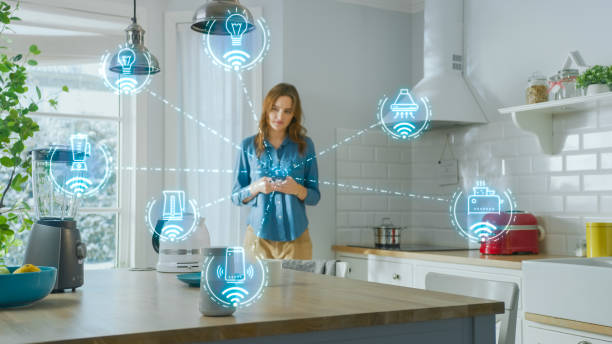Future of Smart Homes and IOTs
By Kamsee Writes
4 min Read

Imagine a home that anticipates your needs, seamlessly integrates with your routine, and offers unparalleled levels of comfort and efficiency. This is the vision of the future of smart homes, powered by the ever-evolving realm of the Internet of Things (IoT).

Table of Content
- Introduction
- Integration and interconnectivity
- Artificial Intelligence and Machine Learning
- Enhanced Security and Privacy
- Energy Efficiency and Sustainability
- Health and Wellness
- Personalization and Customization
- Challenges and Considerations
- Conclusion
Introduction
In the era of technological advancement, the concept of smart homes and the Internet of Things (IoT) has emerged as a revolutionary force, reshaping the way we live, work, and interact with our surroundings. In a way, there has been an adverse effect on people in general. I.e. social media. Smart homes integrate various devices and appliances, interconnected through the internet, to provide homeowners with enhanced control, convenience, and efficiency. As we delve into the future, the trajectory of smart homes and IoT promises even more profound transformations, with innovations poised to redefine the very fabric of our domestic existence.
Integration and Interconnectivity
One of the key aspects propelling the future of smart homes is the seamless integration and interconnectivity of devices. As IoT technology continues to evolve, smart devices will become increasingly interconnected, fostering a cohesive ecosystem where each component communicates and collaborates with others. Imagine a scenario where your thermostat communicates with your smart lighting system to adjust brightness based on the time of day and ambient temperature, or your refrigerator sends notifications to your smartphone when groceries are running low, seamlessly syncing with your online shopping list. One would be able to connect with their homes through IoT technologies.
Artificial Intelligence and Machine Learning
Artificial intelligence (AI) and machine learning (ML) are poised to play a pivotal role in the evolution of smart homes. With advancements in AI algorithms and processing power, smart devices will become more intuitive and adaptive, learning from user behaviour and preferences to anticipate needs and automate routine tasks. For instance, AI-powered smart assistants will become more conversational and proactive, capable of understanding complex commands and executing tasks with minimal input from users. From optimizing energy consumption to enhancing home security, AI-driven smart homes will offer unparalleled convenience and efficiency.

Enhanced Security and Privacy
As smart homes become more interconnected, ensuring robust security and privacy measures will be paramount. Manufacturers and developers must prioritize cybersecurity to safeguard against potential threats and vulnerabilities. Advanced encryption protocols, biometric authentication, and secure data transmission mechanisms will become standard features of smart home devices, providing homeowners with peace of mind knowing their personal information and property are protected. Moreover, increased emphasis on user privacy will drive the adoption of privacy-preserving technologies, empowering individuals to control and manage their data within the smart home ecosystem.
Energy Efficiency and Sustainability
The future of smart homes will be characterized by a heightened focus on energy efficiency and sustainability. IoT-enabled devices will leverage real-time data analytics and predictive algorithms to optimize energy consumption, reducing waste and lowering utility costs. Smart thermostats will adjust temperature settings based on occupancy patterns and weather forecasts, while smart lighting systems will automatically dim or turn off lights in unoccupied rooms. Furthermore, renewable energy sources such as solar panels and wind turbines will be seamlessly integrated into smart home ecosystems, enabling homeowners to generate clean energy and reduce their carbon footprint.
Health and Wellness
Smart homes of the future will prioritize occupant health and wellness, leveraging IoT technology to create environments that promote physical and mental well-being. From smart air purifiers that monitor indoor air quality to sleep-tracking devices that optimize bedroom conditions for restful sleep, the integration of health-centric technologies will revolutionize how we care for ourselves within our homes. Additionally, IoT-enabled healthcare devices and remote monitoring systems will enable individuals to manage chronic conditions and receive personalized medical care from the comfort of their own homes, enhancing accessibility and convenience while reducing healthcare costs.

Personalization and Customization
Unprecedented levels of personalization and customization, catering to the unique needs and preferences of individual homeowners will characterize the future of smart homes. Wearable technologies have been initiated for personalization and customization to the owner's taste. AI-driven algorithms will analyze vast amounts of data to generate personalized recommendations and automate daily routines, adapting to changing circumstances and evolving user preferences. Whether it's adjusting lighting and temperature settings to create the perfect ambience or curating entertainment options based on personal interests, smart homes will offer tailored experiences that enhance comfort, convenience, and overall quality of life.
Challenges and Considerations
Despite the promise and potential of smart homes and IoT, several challenges and considerations must be addressed to realize their full benefits. Interoperability and compatibility issues between different devices and platforms remain a significant hurdle, requiring industry-wide collaboration and standardization efforts to ensure seamless integration and user experience. Moreover, concerns surrounding data privacy, security vulnerabilities, and ethical implications of AI-driven technologies must be carefully addressed to build trust and confidence among consumers.
Conclusion
The future of smart homes and IoT holds immense promise, offering a glimpse into a world where technology seamlessly integrates into every aspect of our daily lives to enhance comfort, convenience, and sustainability. With advancements in AI, IoT, and connectivity, smart homes will evolve into intelligent ecosystems that anticipate and fulfil our needs, revolutionizing the way we live, work, and interact with our surroundings. By addressing challenges and embracing innovation, we can unlock the full potential of smart homes to create a more connected, efficient, and harmonious living environment for generations to come.



